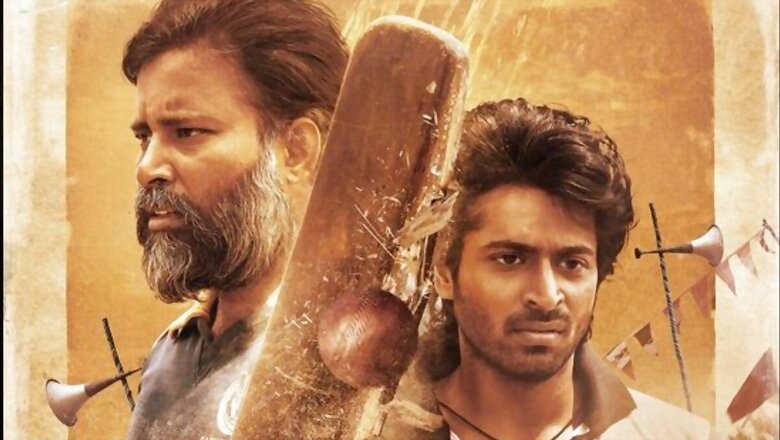
views
“Why do you like cricket so much? What’s the reason?” wonders a doctor to her old school friend, who had approached her for a donation for his upcoming local cricket tournament. The guy is in his fifties. So, the tone of the question is laden with disparagement and disregard for the local tournament. While she, as a good friend, agrees to donate, she doesn’t seem to understand why her ageing friend is throwing away his life on something as trivial as a local cricket tournament. Kali Venkat replies, “I like it and that itself is the reason.” It is a simple and subtle scene that justifies why the characters in the film do what they do. It would have been easy for director Tamizharasn Pachamuthu to resort to cliches to explore the passion of these loveable characters who risk their relationships for the game of cricket. A song by the film’s composer Sean Roldan would have been an easier way out, but the film doesn’t bother much about telling you the reason behind the passion. Mind you, the film is just about rubber ball cricket. Yet, we do understand their ego, their rebellion, the fights, and what’s at stake. It might just be gully cricket, but the spirit of it is in no way subpar to what’s played at the international level. To borrow the lines of Ulagam Oruvanuka from Pa Ranjith’s Kabali song (which is in turn inspired by Mark Twain’s quote): “It ain’t about the size of the dog in the fight, but the spirit of the fight in the dog. That’s right!”
The passion for the game is evident in one of the film’s two lead characters, Poomalai (Dinesh) and his defiance of his wife’s plea to leave the game. Despite his wife’s constant pleas and fights, he continues to play cricket jeopardising his marriage. He paints for a living, but he hardly shows up to work as he is busy sending balls up in the air in local cricket matches. He goes by the moniker ‘Gethu (Pride)’, and whenever he steps into the field, his dear friend makes sure a song from Gethu’s idol Vijayakanth is played to hype him up. On the other hand, in the neighbouring village, we have Anbu (Harish Kalyan), who grew up watching Gethu play in his youth. He grows up to become a passionate and brilliant cricketer himself. Despite his abilities, his own local team ‘Jolly Boys’, don’t let him be a part due to his caste. So, Anbu ends up becoming a local legendary guest player. He plays for any team which respects his prowess and thus possesses numerous jerseys, but his loyalty remains to Jolly Boys. In a turn of events, Gethu and Anbu end up becoming rivals, but the bigger problem is that Anbu is in love with Gethu’s daughter Durga (a brilliant Sanjana Krishnamoorthy). Things get ugly on and off the field. The first half of the film is about this incredible drama of the two characters realising their predicament. It results in brilliant dramatic moments that are uproariously hilarious and immensely moving.
In a film about these angry Tamizharasn Pachamuthu has written some wonderful and powerful women characters who serve as the fulcrum of the whole plot. Gethu’s wife Yashoda (Swasika)’s anger is utterly justified, and she is not reduced to a villain figure. She had eloped with him when she was just 17 as their families were against inter-caste marriage. She carries the weight of holding the family together, while her ‘circkholic’ husband constantly lies and keeps playing the game. Her daughter, on the other hand, falls for Anbu because he carries a passion for the game just like her father. This makes Lubber Pandhu a brilliant watch. We get to witness some brilliantly etched-out characters in an equally brilliant dramatic premise–something that has become hard to come by these days in Tamil cinema. When big-budget films, despite being promoted as having an emotional core, fail to win the emotional investment of the viewer, Lubber Bandhu wins it effortlessly because here the stakes are realistic, not high. People are relatable and the director bothers to imbibe some depth to them. An example of such writing is the entry of a promising player towards the end of the film. He plays for the opposite team of Anbu, but in an ultra-small intercut, the director manages to establish that the youngster is a fan of Anbu and grew up watching him play. In an instant, the film hints at how things pass on for generations, and suddenly we realise these tournaments are much more than just ‘local games’.
On top of it, Tamizharasn Pachamuthu has a brilliant subtext about caste discrimination in sports. Here too, the director doesn’t resort to cliches but handles with such a sophistication that is rare to see in a debutant director. He brings out the reason behind why the men in the film and we love sports. It is a place where everything becomes fair and equal, and talent always gets rewarded no matter who has it. Lubber Pandhu leaves you with a fulfilled heart and a well-fed mind that comes after watching a brilliant cricket match, where both teams gave it their all. It is hard to define sportsmanship in absolute terms, but seeing Lubber Pandhu one can get it.



















Comments
0 comment